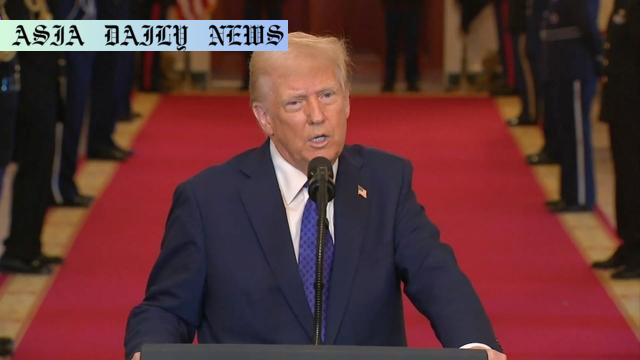Guantanamo Facility – US President Donald Trump plans to expand Guantanamo Bay to accommodate 30,000 undocumented immigrants.
Guantanamo Bay facility is set to expand and house 30,000 undocumented immigrants.
Trump labels the immigrants as ‘the worst criminal aliens’ to justify this move.
Critics raise concerns about human rights and freedom of speech within these actions.
Additional executive orders address anti-Semitism and education reforms.

Introduction to the Announcement
In a move that has sparked significant debate, US President Donald Trump announced that the Guantanamo Bay facility in Cuba would be expanded to house up to 30,000 undocumented immigrants as part of the government’s intensified efforts to address illegal immigration. This announcement was made during a speech at the White House, marking yet another divisive step in Trump’s ongoing immigration crackdown.
The Facility and Its Purpose
Trump emphasized the need for heightened security regarding undocumented immigrants, labeling them as “the worst criminal aliens.” The Guantanamo Bay facility, historically known for detaining individuals with suspected ties to terrorism since the 9/11 attacks, will now serve the purpose of imprisoning individuals deemed as high-risk undocumented migrants. Trump stated that Guantanamo’s reputation as “a tough place to get out of” further underscores its suitability for this initiative.
Details of the Executive Order
The executive order signed by Trump outlines plans for the expansion of the Migrant Operations Center, already present at the Guantanamo Bay area, to accommodate the anticipated influx of detainees. Media reports have indicated that this center, which traditionally handles individuals detained at sea, could soon undergo extensive repurposing for a more permanent and larger-scale use.
Impact of Immigration Policies
Since assuming office, the Trump administration has ramped up measures to target undocumented immigrants, particularly those with criminal records. According to Trump’s rhetoric, this new measure is part of a broader strategy to ensure that dangerous individuals are either deported effectively or held permanently in facilities operated by the United States government.
Repercussions on Freedom and Rights
However, many critics have expressed concerns over the ethical and legal ramifications of this decision. The push to detain such a large volume of undocumented immigrants at Guantanamo raises questions about human rights violations, including the potential treatment of detainees and the living conditions they might endure. Critics also worry that this move could infringe on the United States’ reputation as a nation built on individual liberties and fair treatment of all.
Additional Executive Measures
Trump also announced separate executive orders targeting international students and controversial curriculums in education. One order stipulates the deportation of international students accused of anti-Semitic activities, a measure that has been criticized for potentially suppressing freedom of speech on college campuses. Another order threatens to slash funding for educational institutions accused of promoting ‘radical and anti-American ideologies.’
Public Reaction
The expansion of Guantanamo Bay has garnered mixed reactions. Supporters of the move argue that it bolsters national security by ensuring the most dangerous aliens are detained securely. At the same time, human rights advocates warn against the inhumane treatment of detainees and call for international oversight of such detention programs.
Conclusion and Future Implications
As the Trump administration continues to pursue aggressive immigration reforms, the expansion of Guantanamo Bay represents a symbolic yet contentious step in addressing illegal immigration. While the president and his allies frame the policy as a necessity for national safety, many question its long-term ramifications on human rights, international reputation, and America’s commitment to democratic values.
Commentary
Immigration Policy or Overreach?
The decision to expand the Guantanamo Bay facility for undocumented immigrants marks an unprecedented move, one that has far-reaching implications for America’s immigration system. While it may resonate with Trump’s base, who view strict immigration measures as critical to preserving national security, the move also raises important ethical and humanitarian concerns. Could this represent an overreach of presidential power that risks undermining basic human decency?
Balancing Security and Rights
While national security is a legitimate concern, the labeling of 30,000 undocumented immigrants as “the worst criminal aliens” seems a broad-brush approach that unfairly stigmatizes individuals. Many of these people may simply be seeking a better life, escaping violence or hardship in their home countries. Is Guantanamo Bay, with its controversial legacy, the right place to address this issue?
Educational and Ideological Controversy
Moreover, the additional orders targeting educational institutions and international students further complicate the narrative. By linking student deportation to political or ideological beliefs, Trump risks infringing on the constitutionally protected right to free speech. Education, often seen as a cornerstone of American democracy, may suffer under policies that prioritize division over dialogue.
Final Thoughts
Ultimately, the decision to expand Guantanamo and introduce these new measures reflects a broader trend toward more aggressive, and perhaps polarizing, government policies. It remains critical for policymakers, human rights organizations, and citizens alike to scrutinize these decisions and ensure that America continues to stand for freedom, fairness, and justice.


